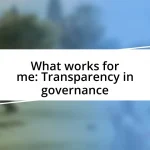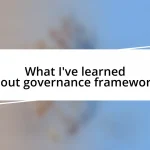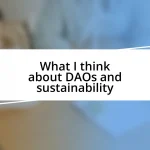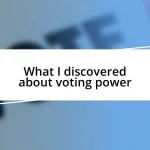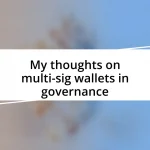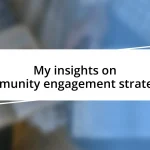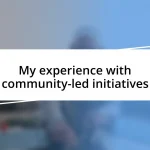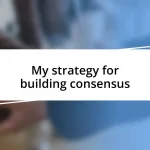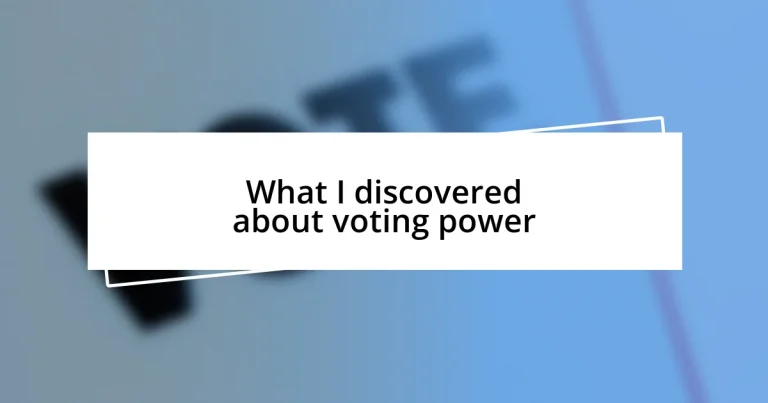Key takeaways:
- Voter participation is vital for democracy, impacting representation and decision-making at various levels.
- Historical shifts in voting power, like women’s suffrage and the Voting Rights Act, have transformed political landscapes and emphasize the importance of voting rights.
- Building community connections, educating voters, and leveraging technology are essential strategies to enhance collective voting power and engage more individuals in the electoral process.
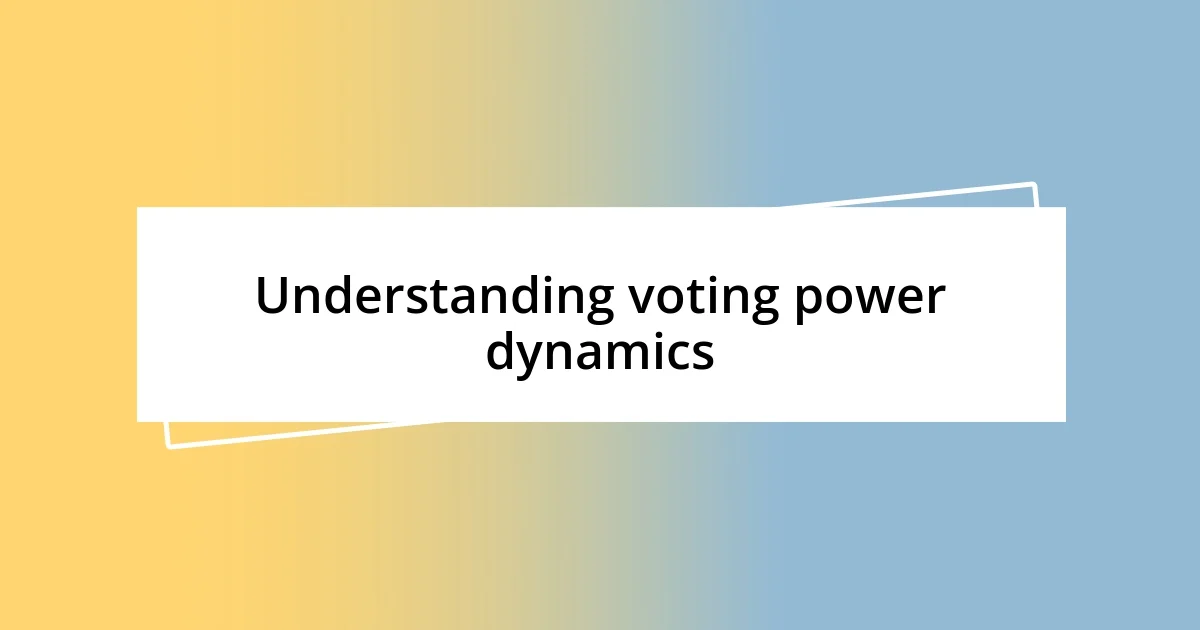
Understanding voting power dynamics
Voting power dynamics can often feel like a complex web, don’t you think? I remember my first experience at the polls; I was surprised to see how my individual vote, when combined with others, could sway an election. It made me appreciate how crucial collective action is in shaping outcomes.
Understanding voting power isn’t just about numbers; it’s about voices. I once spoke to a passionate activist who emphasized that the real power lies in informed voters rallying for a common cause. Her fervor made me realize that each vote is a piece of a larger puzzle, and when we understand how it fits, we can advocate more effectively.
It’s fascinating how certain demographics wield more voting power due to their concentrated populations or strategic alliances. Have you ever thought about how gerrymandering affects representation? Personally, learning about its implications sparked a fire in me to delve deeper into local policies. Recognizing these dynamics helps illuminate the often-hidden influences on our democracy.
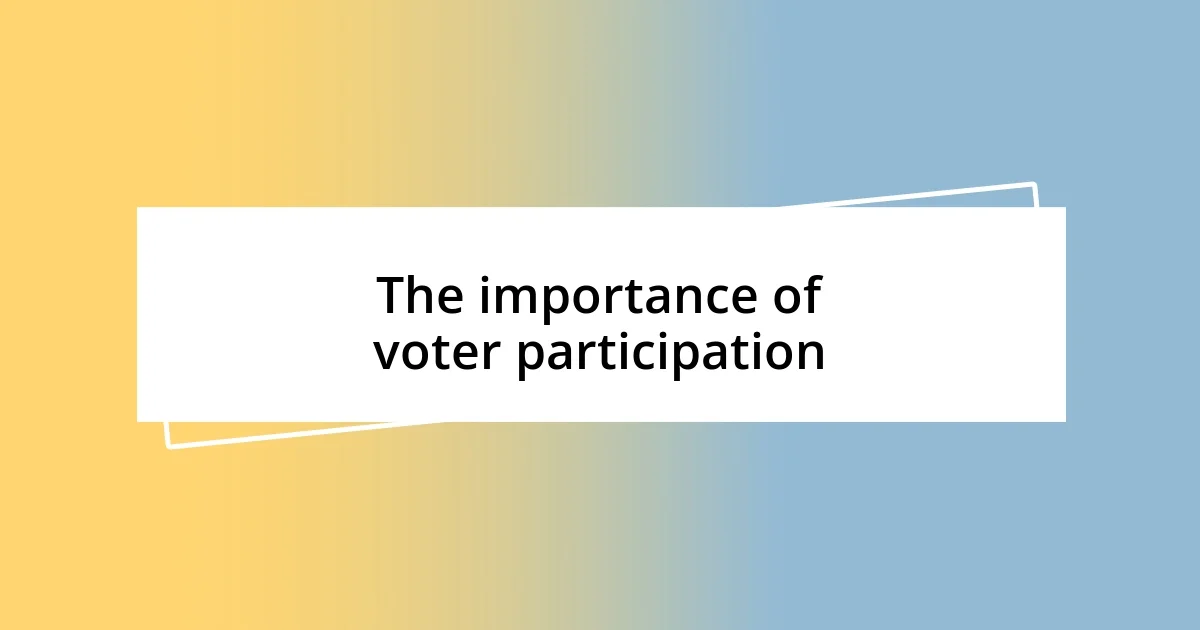
The importance of voter participation
Voting is not just a right; it’s a privilege that carries immense weight in shaping our society. I remember during a local election, standing in line and overhearing conversations filled with hope and concern. It struck me how passionately people engage with the process, underlining the fact that voter participation is vital. Each individual who casts a ballot adds to the momentum of democracy, creating a powerful wave that can lead to significant change.
- Voter participation directly impacts decision-making at local, state, and national levels.
- Engaged voters can hold elected officials accountable for their actions.
- High turnout rates can lead to better representation of diverse communities.
- Every vote counts; close elections can hinge on a small number of ballots.
- Participation fosters a sense of community and shared responsibility.
I often find myself reflecting on the sense of empowerment I felt after voting for the first time. It was as if I had a seat at the table, contributing to discussions that affect my life and those around me. That moment reminded me that when people participate, they wield the power to influence policies and advocate for their values. It’s a reminder that our voice matters, and in a democracy, participation isn’t just encouraged – it’s essential.
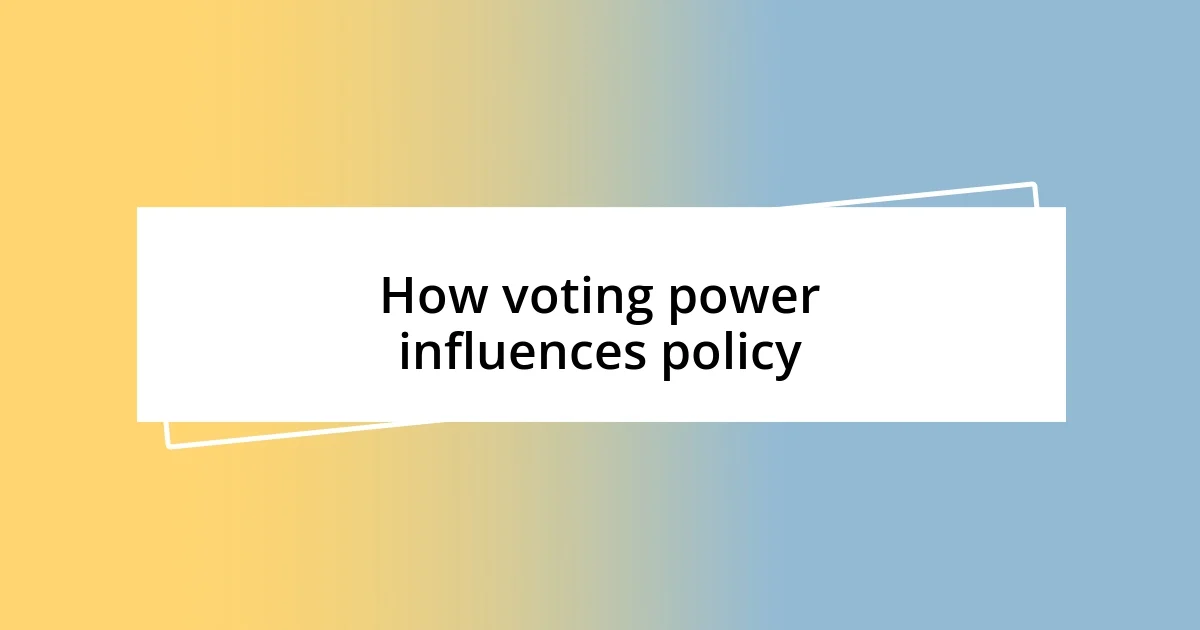
How voting power influences policy
Voting power has an undeniable ripple effect on policy making. I recall attending a town hall meeting where local representatives discussed pending legislation. It was enlightening to see how their decisions could shift based on the public’s response. When a community comes together, they can really steer the direction of policy issues that matter most to them, transforming individual concerns into collective demands.
When influential voter blocs mobilize, they create pressure for change that policymakers can’t ignore. For instance, I witnessed this firsthand during a campaign focused on climate change initiatives. The overwhelming support from younger voters prompted candidates to prioritize environmental policies in their platforms. It struck me how powerful dedicated groups can be, as their voting power not only influences who gets elected but also the priorities of those in office.
To illustrate the importance of voting power on policy, let’s look at how different factors can shape outcomes:
| Factor | Influence on Policy |
|---|---|
| Voter Turnout | Higher turnout often leads to policies that reflect the preferences of the majority. |
| Demographics | Different groups (age, race, etc.) bring unique perspectives that can shift policy focus. |
| Interest Groups | Organized groups leverage their voting power to advocate for specific issues. |
| Election Timing | Timing of elections can affect voter engagement and policy priorities on the ballot. |
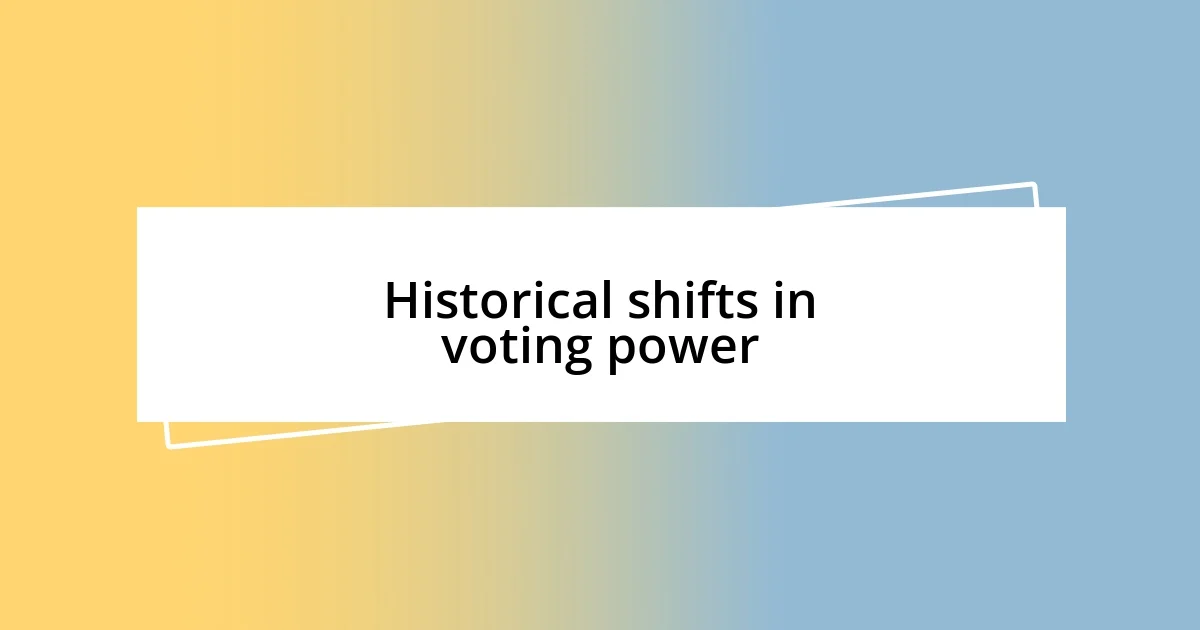
Historical shifts in voting power
Historical shifts in voting power have often mirrored broader changes in society. For example, when women gained the right to vote in 1920, it was a monumental leap towards gender equality. I remember learning about the suffragist movement in school, and I was struck by how their relentless perseverance changed the political landscape forever. Imagine the realization of countless women who fought for years, knowing they could finally voice their opinions on issues that mattered to them.
Similarly, the Voting Rights Act of 1965 represented another significant shift. Growing up, I was always moved by stories of civil rights activists who faced overwhelming adversity to secure voting rights for African Americans. It’s hard to fathom, but many were denied their fundamental right due to discriminatory practices. Reflecting on this, I can’t help but feel grateful for the progress made, yet it also makes me ponder: what would happen if those who benefitted from these rights didn’t take the time to vote?
In more recent history, the expansion of access to voting through mail-in ballots and early voting has altered the dynamics of elections significantly. I vividly remember my excitement during an election where I could mail in my ballot for the first time. That convenience made it so much easier for people to participate. It raises an important question: how will future innovations continue to transform our understanding of voting power? Each shift leaves a unique mark, echoing the struggles and triumphs of those who came before us.
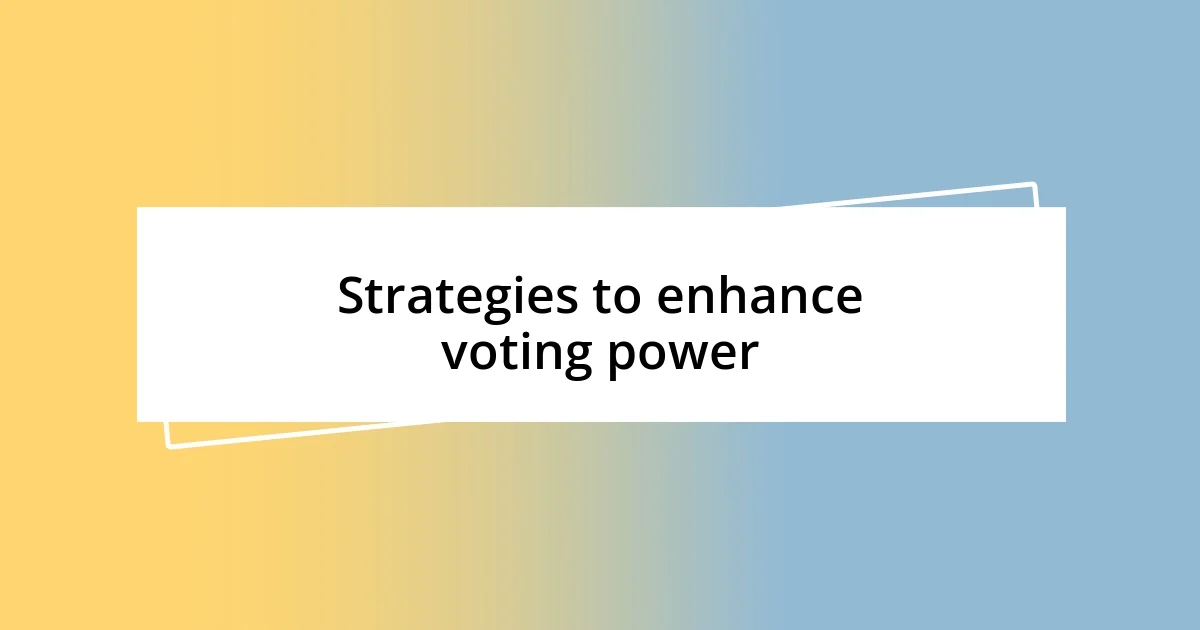
Strategies to enhance voting power
To enhance voting power, I believe we all can benefit from fostering strong community connections. When I volunteered at a local organization, I noticed how, when people gathered to discuss issues that mattered to them, they formed a collective voice that resonated with local leaders. These grassroots efforts can amplify individual concerns into a powerful wave that influences decision-makers.
Educating yourself and others about the electoral process is another vital strategy. I once participated in a voter education workshop, where we explored the intricacies of ballot measures and candidates’ platforms. It was eye-opening to hear different perspectives and recognize how informed voters can make decisions that reflect their community’s values. Isn’t it amazing how knowledge can empower you to advocate for your beliefs more effectively?
Finally, utilizing technology to mobilize and reach out can dramatically enhance voting power. During the last election cycle, I experimented with social media campaigns to remind friends and family about voting deadlines. The response was heartwarming, as many shared how those nudges helped them stay engaged. How often do we underestimate the impact of a simple reminder in our digital world? Each of these strategies, when combined, can create a formidable wave of voting power.
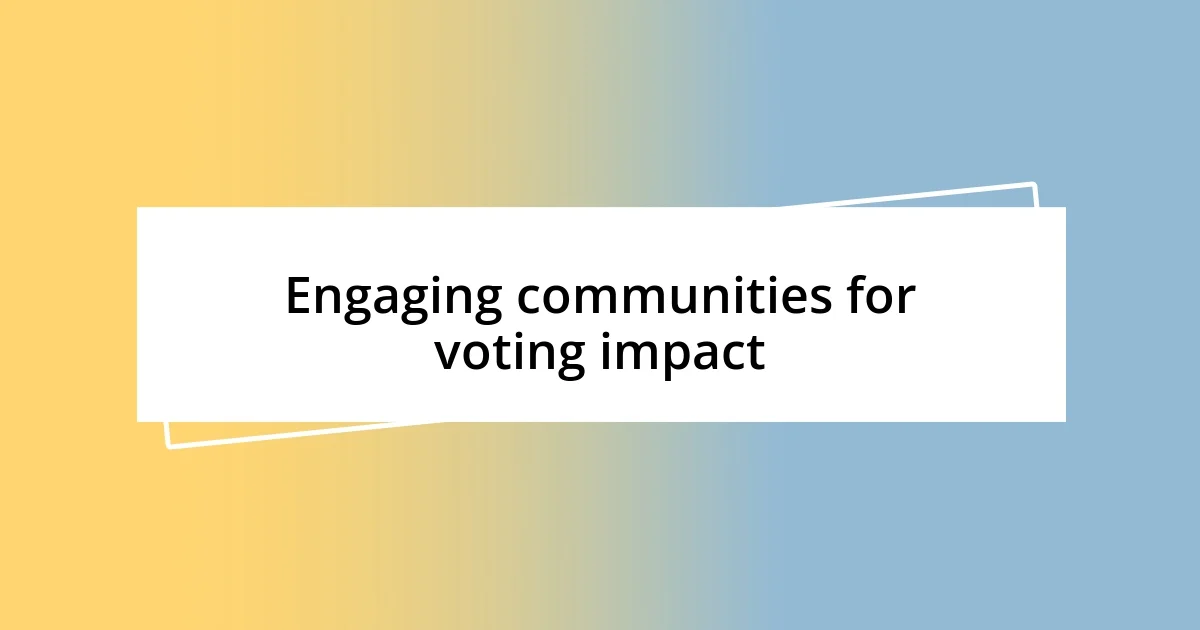
Engaging communities for voting impact
Engaging communities for voting impact is all about connection and shared purpose. I remember attending a neighborhood meeting where residents discussed local issues, and it struck me how passionate everyone was. It’s fascinating to see how a simple gathering can turn into a powerful movement when folks realize they’re not alone in their concerns. Isn’t it uplifting to think about the collective strength we gain from sharing our experiences?
One approach I’ve found effective is hosting informal workshops focused on understanding electoral rights and local representatives. I once facilitated a session where community members shared their voting stories, and their enthusiasm was infectious. It reminded me that when people can relate their personal experiences to the larger political landscape, they’re more likely to take action. How can we harness that energy to create lasting voting engagement?
Additionally, I’ve noticed that outreach through local events, like farmers’ markets or festivals, can lead to meaningful conversations about voting. I recall setting up a booth at a community fair where I engaged with people one-on-one about the importance of their vote. Those moments were eye-opening because they often revealed hesitations or misconceptions about the process. What if we created more of these spaces for dialogue? By making voting a community-centered conversation, we can inspire many to see the power of their voice at the ballot box.
